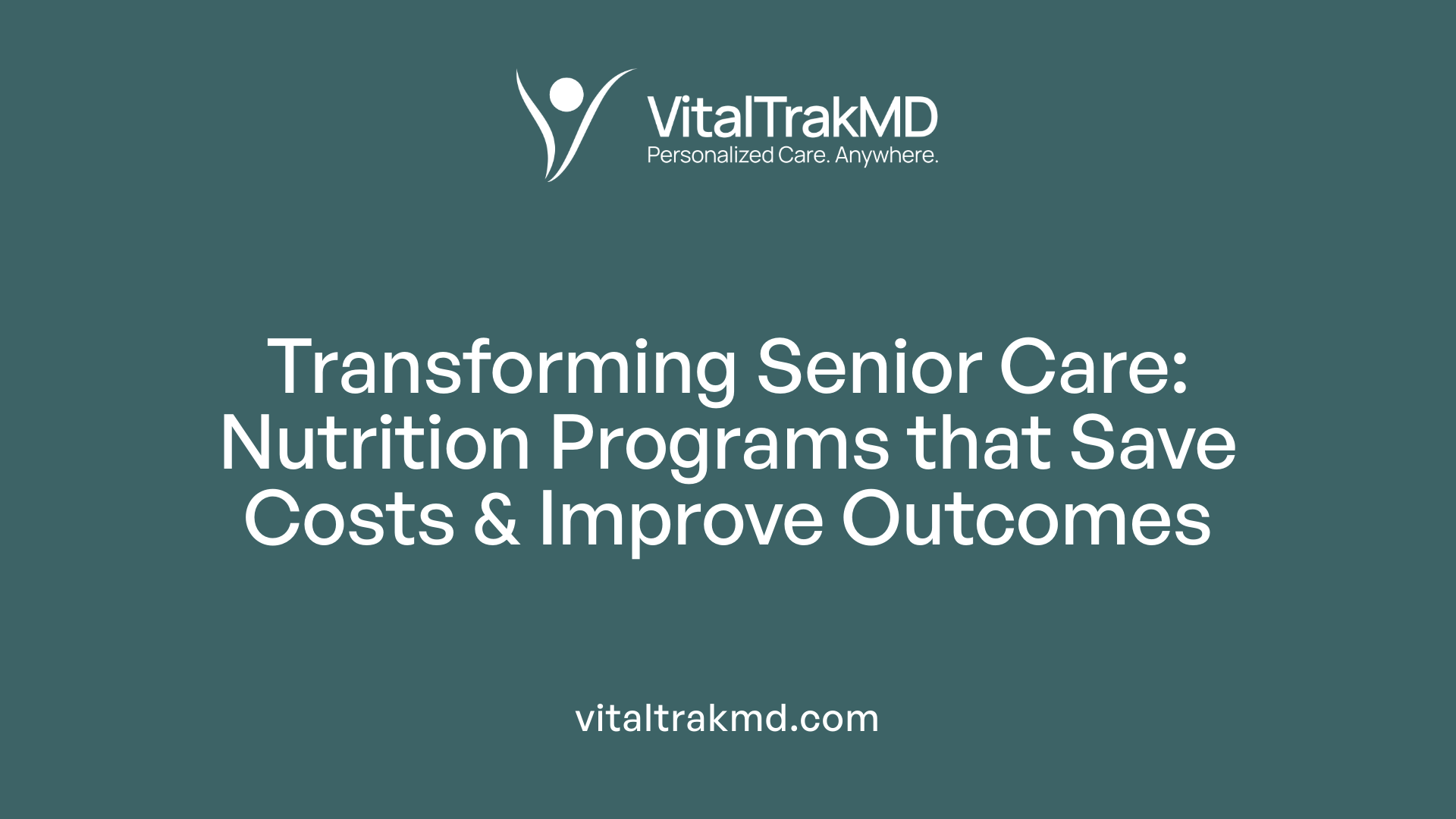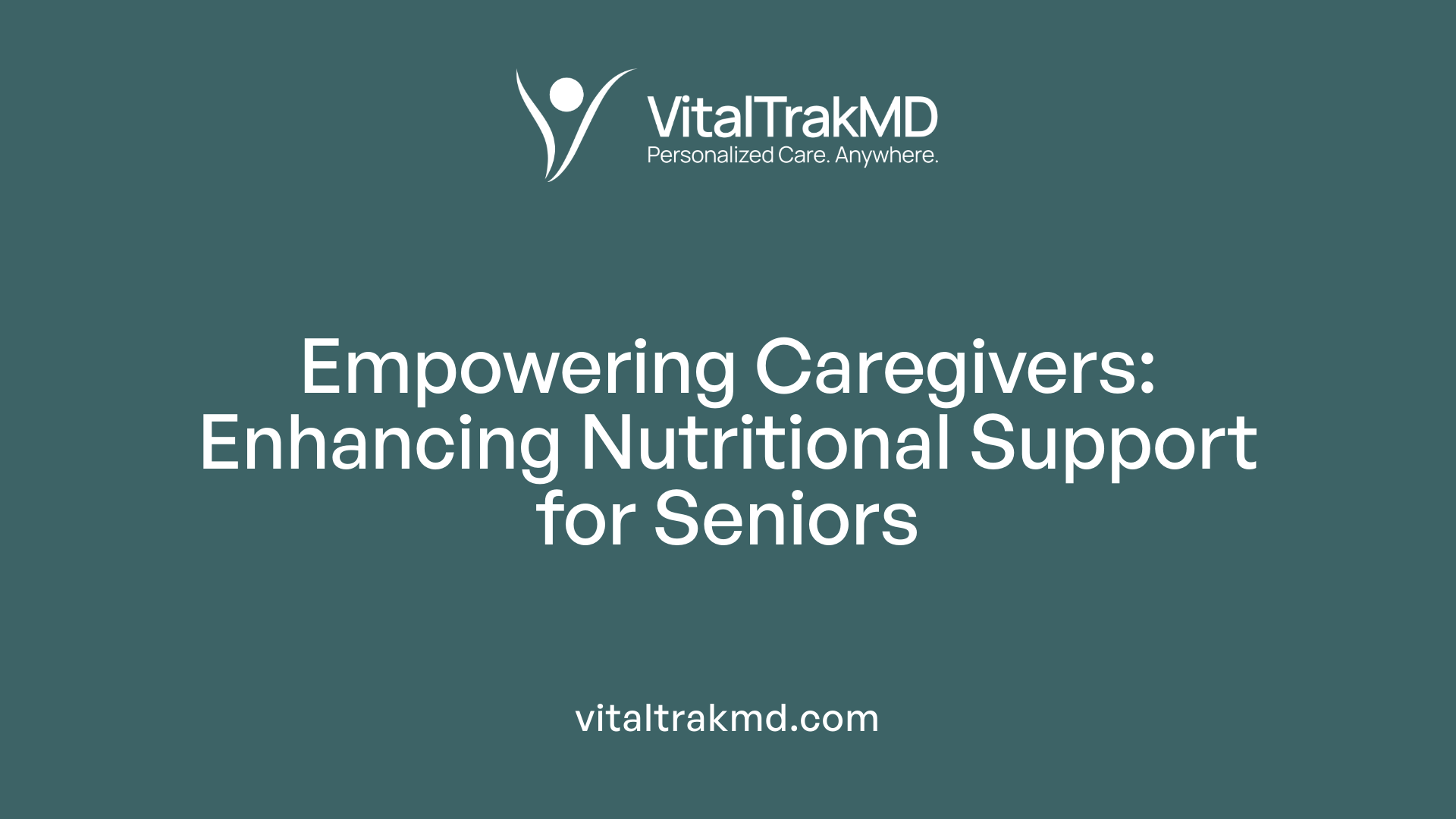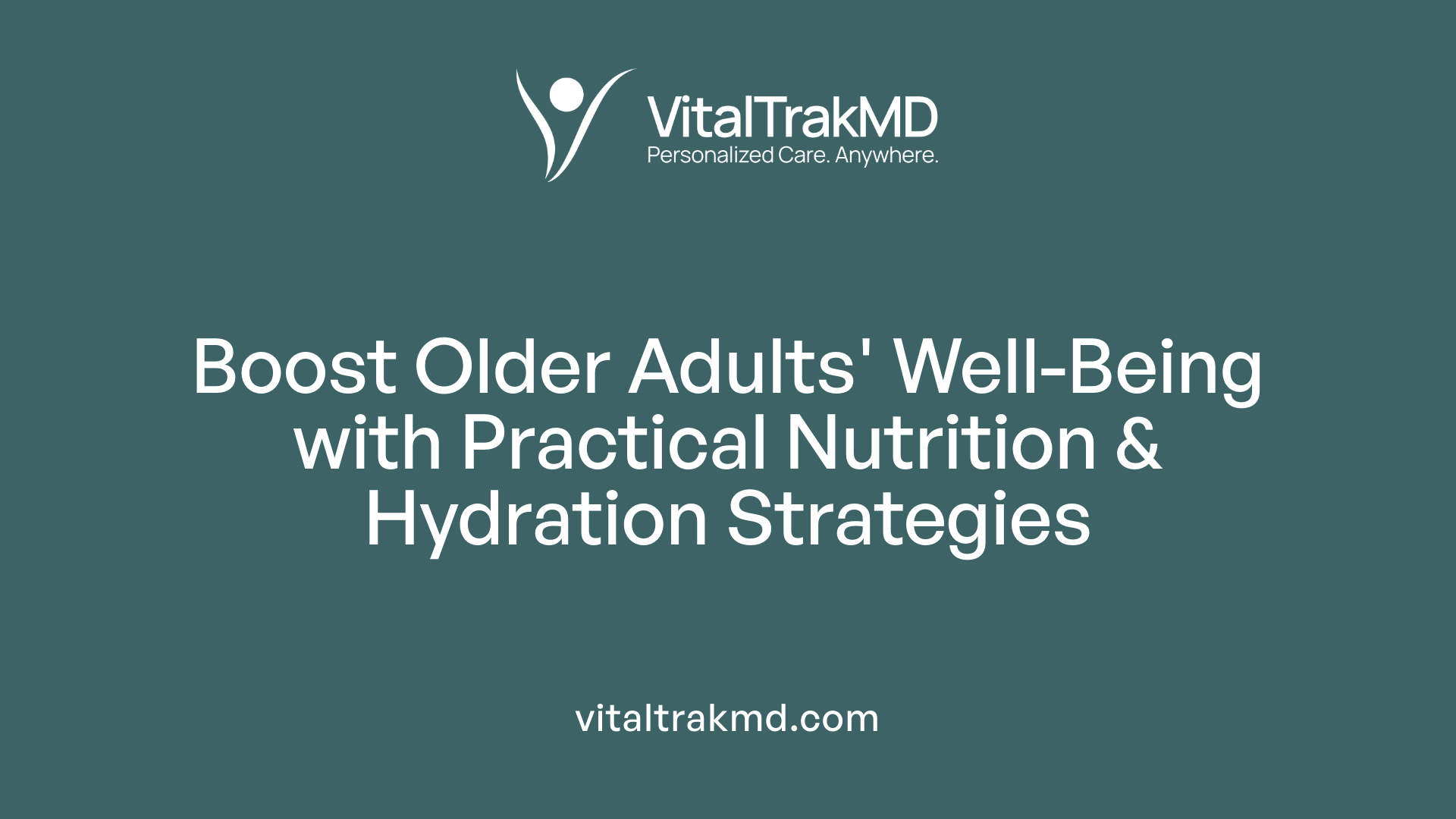Nutrition-Focused In-Home Care for Aging Adults

Addressing the Critical Role of Nutrition in Aging in Place
As the aging population continues to grow, ensuring proper nutrition within the comfort of the home has become essential for maintaining health, independence, and quality of life. Nutrition-focused in-home care combines tailored meal planning, social engagement, and health monitoring, empowering older adults to meet their dietary needs while managing chronic conditions and preventing malnutrition. This article explores key strategies, programs, and research findings that highlight the importance of comprehensive nutritional support for seniors living at home.
Impact of Nutrition-Focused Care Programs on Healthcare Utilization and Cost Savings

How can caregivers improve nutrient intake and hydration of older adults?
Caregivers play a vital role in enhancing the nutritional status and hydration of older adults. They can prepare balanced, appealing meals rich in nutrient-dense foods like fruits, vegetables, lean proteins, whole grains, and healthy fats. Offering smaller, more frequent meals can help seniors with reduced appetites and aid digestion. Incorporating hydration-rich foods such as soups, fruits, and vegetables boosts fluid intake. Encouraging the consumption of calcium, vitamin D, vitamin B12, fiber, and potassium is crucial, often through foods or supplements recommended by healthcare providers. Making mealtime social and enjoyable can significantly increase appetite and emotional well-being. Caregivers should assist seniors with grocery shopping, meal planning, and ensuring they regularly drink fluids. Limiting processed foods high in sugar and sodium helps prevent chronic diseases, supporting overall independence and health.
What are the specific nutritional recommendations for older adults?
Nutritional guidance for seniors emphasizes the consumption of nutrient-dense foods such as fruits, vegetables, whole grains, dairy, and lean protein sources like seafood, beans, and lentils. These foods support muscle maintenance, bone health, and overall vitality. Due to decreased nutrient absorption, vitamin B12 supplementation might be necessary under medical supervision. Hydration remains essential; seniors should aim to consume about six to eight glasses of water daily, choosing fluids like water, milk, or fortified beverages. Limiting saturated fats, added sugars, and sodium helps reduce the risk of chronic conditions such as heart disease and high blood pressure. Incorporating regular physical activity and consulting healthcare professionals can further promote healthy aging.
What are the general dietary guidelines for older adults?
For healthy aging, dietary guidelines stress the importance of including all major food groups—fruits, vegetables, grains, proteins, and dairy—in daily meals. Portion control tailored to decreased caloric needs ensures sufficient intake of vital nutrients like calcium, vitamin D, B12, potassium, and fiber. Protein intake should be about 5-6.5 ounces daily to preserve muscle mass and strength. Adequate hydration is critical, given that older adults often have a diminished sense of thirst. Limiting sodium intake to less than 6 grams per day and avoiding excessive saturated fats and added sugars are recommended. Adopting dietary patterns such as the Mediterranean or DASH diet can improve cardiovascular health and promote overall well-being. Social meal sharing and mindful eating are beneficial strategies to foster better adherence to these guidelines.
What are some recommended meal plans or dietary resources for seniors?
Senior-focused meal plans should prioritize nutrient-rich, balanced diets featuring a variety of fruits, vegetables, whole grains, lean proteins, and healthy fats. Consuming at least five servings of fruits and vegetables each day supports immune function and digestive health. Including sources of omega-3 fatty acids, such as oily fish (salmon or mackerel), twice weekly, benefits heart and brain health. Maintaining good hydration with six to eight drinks daily and reducing salt intake with herbs and spices enhances health. Resources like the MyPlate guidelines, DASH diet plan, and Meals on Wheels program provide tailored nutrition strategies and support networks for seniors.
Who is eligible for senior nutrition support programs?
Eligibility typically encompasses individuals aged 60 and above living in designated areas. Income thresholds are often set at or below 185% of the federal poverty level, ensuring support reaches those most in need. In addition to age and income, residency within specific communities or jurisdictions is usually required. Support programs are accessible through local agencies, senior centers, and healthcare providers, with applications often available in person. Participation in programs such as the Older Americans Act (OAA) Nutrition Programs enables access to nutritious meals, social engagement opportunities, and health support services.
Additional Insights
The National Senior Nutrition Program serves nearly one million nutritious meals daily across approximately 5,000 community providers, underscoring its scale and impact. Meals are provided both in congregate settings and through home delivery, supporting socialization, independence, and nutritional health. Federal funding, supplemented by community contributions and volunteers, sustains these programs. In-home health aides and organizations like Keystone Health support seniors by creating personalized meal plans, monitoring nutritional intake, and fostering healthy eating habits. Addressing malnutrition in seniors through tailored nutrition interventions and community support plays a crucial role in maintaining their health and independence.
Below is a summary table highlighting multiple aspects of senior nutrition programs and guidelines:
| Aspect | Description | Additional Details |
|---|---|---|
| Focus Area | Nutrition programs, in-home care | Address malnutrition, promote independence |
| Beneficiaries | Adults 60+ | Socioeconomic and health criteria apply |
| Program Types | Congregate meals, home delivery, support services | Supported by OAA, Medicaid, community funds |
| Nutritional Focus | Nutrient-dense foods, hydration, balanced diet | Emphasizes fruits, vegetables, lean proteins |
| Challenges | Food insecurity, cultural preferences | Barriers include language, transportation |
| Strategies | Culturally appropriate meals, outreach | Increase engagement among minorities |
| Support Resources | Meals on Wheels, SNAP, SFMNP, CACFP | Federal and state programs for nutrition |
| Impact | Reduced hospital and ED visits, cost savings | Over 40% reduction after intervention |
| Cost Effectiveness | Savings of $210/patient over 90 days | Nearly double the program costs |
| Data Support | Real-world observational studies | Valid for policymaking and health planning |
Role of In-Home Care Providers in Supporting Senior Nutrition and Hydration

What are the nutritional challenges faced by seniors?
Older adults often encounter various obstacles that affect their nutritional health. Changes in taste, smell, and appetite can lead to reduced food intake. Medical conditions and medications may interfere with nutrient absorption or cause side effects like nausea, making eating less appealing. Physical limitations or fatigue can hinder meal preparation and grocery shopping, leading to less nutritious diets. Additionally, social isolation during dining can diminish appetite, increasing the risk of malnutrition.
Understanding these challenges is crucial for caregivers and home health aides. Tailoring dietary approaches to meet individual needs, preferences, and health conditions can significantly improve nutritional status and overall well-being among seniors.
How can caregivers improve nutrient intake and hydration of older adults?
Caregivers can play an essential role by preparing balanced, appealing meals rich in nutrient-dense foods like fruits, vegetables, lean meats, whole grains, and healthy fats. Offering smaller, more frequent meals can help seniors with diminished appetites to consume enough calories and nutrients. Incorporating hydration-rich foods such as soups, fruits, and vegetables ensures adequate fluid intake, which is vital for maintaining hydration.
Encouraging dietary intake of calcium, vitamin D, vitamin B12, fiber, and potassium—either through food or supplements as advised by healthcare providers—is beneficial. Making mealtimes social and enjoyable can stimulate appetite and emotional health. Caregivers should also assist with grocery shopping and meal planning, emphasizing the importance of limiting processed foods high in sugar and sodium that can harm health.
What are the specific nutritional recommendations for older adults?
Nutritional guidelines for seniors focus on nutrient-dense foods to support aging bodies. Consuming a variety of fruits, vegetables, whole grains, dairy, and lean protein sources such as seafood, beans, and lentils helps maintain muscle mass, bone strength, and overall health. Supplementation of vitamin B12 may be necessary due to decreased absorption.
Adequate hydration is also essential, with a typical goal of about eight glasses of water per day, adjusted for individual needs. Limiting saturated fats, added sugars, and sodium helps prevent chronic health issues like heart disease and hypertension. Incorporating diets like the Mediterranean or DASH can promote cardiovascular health, while regular physical activity and professional guidance support nutritional goals.
What are the general dietary guidelines for older adults?
Older adults should prioritize nutrient-rich, balanced diets that include diverse food groups. Portion control becomes important as caloric needs decline, focusing instead on the quality of foods. Ensuring enough intake of vitamins D and B12, calcium, potassium, and dietary fiber is vital.
Protein intake should be around 5-6.5 ounces daily to preserve muscle strength. Staying well-hydrated is crucial, especially since thirst sensation diminishes with age. Limiting salt, added sugars, and bad fats reduces disease risk.
Adopting healthy eating patterns such as the Mediterranean or DASH diets can improve cardiovascular health. Social meals and mindful eating habits contribute to better adherence and overall happiness.
What are some recommended meal plans or dietary resources for seniors?
Nutritional plans for seniors should emphasize variety and balance. A daily intake of at least five servings of fruits and vegetables, along with sources of fiber such as pulses and whole grains, supports digestion and reduces disease risk.
Inclusion of oily fish like salmon twice a week provides omega-3 fatty acids essential for brain and heart health. Maintaining proper hydration with six to eight drinks daily and reducing salt intake through herbs and spices enhances health.
Resources such as dietary guidelines from reputable health organizations, meal delivery services like Meals on Wheels, and government programs provide valuable support. Meal cards, community centers, and online platforms offer recipes and meal planning tools tailored for older adults.
Who is eligible for senior nutrition support programs?
Eligibility for these programs typically begins at age 60 and older. Most programs require residents to live in specific geographic areas and have household incomes below certain thresholds, often set at 185% of the federal poverty level. Spouses and certain disabled household members may also qualify.
Applications are usually submitted through local community centers, senior centers, or designated agencies. Eligibility assessments consider age, income, residence, and need, ensuring that support reaches those most at risk of food insecurity and malnutrition.
Enhancing nutrition in older adults through targeted support programs and tailored in-home care can significantly improve health outcomes, independence, and quality of life.
Effective Strategies and Best Practices for Improving Nutrition and Health Outcomes at Home

How can caregivers improve nutrient intake and hydration of older adults?
Caregivers play a vital role in ensuring older adults meet their nutritional needs and stay well-hydrated. They can achieve this by preparing balanced meals rich in nutrient-dense foods such as fruits, vegetables, lean meats, whole grains, and healthy fats. Offering smaller, more frequent meals can help those with diminished appetite or digestion issues. Incorporating foods with high water content — like soups, fruits, and vegetables — encourages sufficient fluid intake. Caregivers should also support the consumption of calcium, vitamin D, B12, fiber, and potassium, either through food or supplements recommended by healthcare providers. Making mealtime social and pleasant can boost appetite and emotional well-being. Assistance with grocery shopping, meal planning, and consistent hydration is essential. Limiting processed foods high in sugar and sodium promotes better health and helps prevent chronic diseases.
What are the specific nutritional recommendations for older adults?
Older adults should focus on a diet rich in nutrient-dense foods that support muscle and bone health. Recommended foods include a variety of fruits, vegetables, whole grains, dairy, and lean protein sources like seafood, beans, and lentils. Due to age-related decreases in nutrient absorption, they should consult healthcare providers about necessary supplements, especially for vitamin B12. Adequate hydration is critical; seniors are encouraged to drink enough fluids such as water, milk, or fortified beverages, noting that thirst perception often diminishes with age. Limiting intake of added sugars, saturated fats, and sodium reduces the risk of cardiovascular disease and other health issues. Regular physical activity, combined with professional guidance, helps meet nutritional goals and supports healthy aging.
What are the general dietary guidelines for older adults?
The dietary guidelines for seniors emphasize selecting nutrient-rich foods from all the major food groups, including fruits, vegetables, lean proteins, whole grains, and dairy. As their caloric needs decrease, portion control and focus on food quality become essential. Ensuring adequate intake of vitamin D, B12, calcium, potassium, and fiber supports overall health. Protein intake should be around 5-6.5 ounces daily to help preserve muscle mass. Hydration is important, with an aim of six to eight drinks per day, as thirst sensation wanes with age. Limiting sodium, added sugars, and unhealthy fats aids in managing chronic conditions such as hypertension and heart disease. Adoption of healthy dietary patterns like the Mediterranean or DASH diets, along with social eating and mindful habits, can improve adherence and outcomes.
What are some recommended meal plans or dietary resources for seniors?
Ideal meal plans for older adults focus on balanced, nutrient-dense diets that include a variety of fruits, vegetables, whole grains, lean proteins, and healthy fats. Consuming at least five servings of fruits and vegetables daily and incorporating fiber-rich foods such as pulses and whole grains support digestive health and reduce disease risks. Regular consumption of oily fish like salmon or mackerel provides omega-3 fatty acids beneficial for heart and brain health. Proper hydration—around six to eight glasses daily—and reducing salt intake with herbs and spices enhance overall health. Resources like the "MyPlate" guidelines, DASH diet materials, and nutritionist consultations offer practical support for meal planning. Using meal delivery services such as Meals on Wheels, community congregate meals, and local food assistance programs further promote access to nutritious foods.
Who is eligible for senior nutrition support programs?
Eligibility for senior nutrition programs typically applies to individuals aged 60 and above. Most programs target low-income seniors, with income limits often set at or below 185% of the federal poverty level. Residency in specific communities or jurisdictions is generally required. Eligibility may also include spouses and persons with disabilities living with eligible seniors. The application process usually involves submitting paperwork through local agencies or community centers. These programs are designed to help vulnerable older adults maintain nutrition, prevent malnutrition, and promote independence. Support can come via home-delivered meals, congregate dining, food assistance, or supplemental food programs, and participation is vital in combating food insecurity among seniors.
| Aspect | Details | Additional Info |
|---|---|---|
| Program Focus | Community-based nutrition, preventing malnutrition | Offers nutritious meals, education, screening |
| Major Legislation | Title III-C of the Older Americans Act | Supports local and national services |
| Meal Types | Congregate and home-delivered meals | Promote socialization and health monitoring |
| Support Services | Nutrition counseling, education | By registered dietitians and caregivers |
| Funding Sources | Federal, community, volunteers | Emphasize community investment |
| Challenges | Cultural relevance, accessibility | Managed via outreach, tailored menu options |
| Resources for Participants | Meal programs, SNAP, food banks | Various federal and local programs |
| Benefits | Improved health, reduced falls and loneliness | Evidence-based, community-supported |
Fostering Independence and Well-Being Through Nutrition
Providing comprehensive, nutrition-focused in-home care is fundamental to promoting healthy aging. Effective caregiver support, access to federally funded programs, and adherence to personalized dietary plans enable seniors to maintain energy, prevent illness, and enjoy a higher quality of life. As research indicates, such interventions not only improve individual health outcomes but also offer significant economic benefits by reducing healthcare utilization. By prioritizing nutrition as a core component of in-home care, communities can significantly enhance the lives of older adults, supporting their independence and fostering a sense of well-being.
References
- Nutrition-Focused Care for Community-Living Adults: Healthcare ...
- Nutrition Services | ACL Administration for Community Living
- The Role of Home Health Aides in Supporting Senior Nutrition
- Senior Nutrition Program | At Your Side Home Care | Texas
- How Senior Home Care Helps with Nutrition - Touching Hearts
- Enriching nutrition programs to better serve the needs of a ...
- Nutrition Assistance for Seniors Living at Home - ElderLife Financial
- Nutrition Programs for Seniors
- Nutrition and In-Home Care: Ensuring a Balanced Diet for Seniors
Recent articles
Want to Feel Better and Live Healthier?
Join hundreds of patients taking control of their health with personalized care that fits their life – not the other way around.
Rated 4.8/5 by 32+ customers







